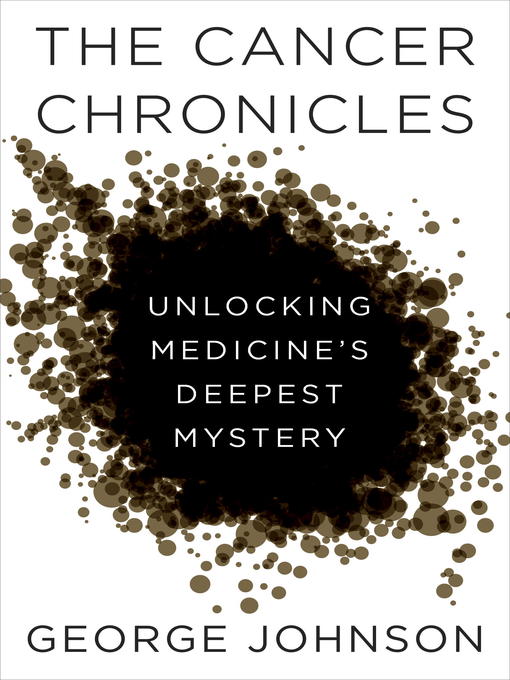
The Cancer Chronicles
Unlocking Medicine's Deepest Mystery
باز کردن عمیقترین اسرار مدیسینtesT
کتاب های مرتبط
- اطلاعات
- نقد و بررسی
- دیدگاه کاربران
نقد و بررسی

Starred review from June 10, 2013
It’s his wife Nancy’s grueling fight against a rare and “rabid” uterine cancer that prompts science writer Johnson (The Ten Most Beautiful Experiments) to delve into the efforts to study, treat, and beat what Siddhartha Mukherjee dubbed “The Emperor of All Maladies.” This elegant and insightful chronicle is at once intensely personal and meticulously studious, focusing not just on one cancer, but on the evolution of all cancers. He finds it “comforting... knowing that cancer has always been with us, that it is not all our fault, that you can take every precaution and still something in the genetic coils can become unsprung.” Cancer, he explains, can be blamed on “factors that have been present for a long time” (the disease beset even prehistoric dinosaurs). In fact, researchers are finding that any one case of cancer may have multiple causes, whether environmental, hereditary, or “elusive… bad luck.” Cancer, he concludes, “is a phenomenon” that is “mostly random.” Yet we are getting a clearer picture of how it works: cancer’s “metabolic puzzle” may lie in “how the body stores and uses energy… Insulin, estrogen, obesity, cancer—all are tied in to the same metabolic knot.” This is extraordinary scholarship delivered with an intimate poignancy. Agent: Esther Newberg, ICM.

June 15, 2013
Not quite "abandon all hope," but there's not much to cheer about in this wide-angled survey of where we are in the fight against cancer. Science writer Johnson (The Ten Most Beautiful Experiments, 2008, etc.) has steeped himself in cancer lore, attended conferences and interviewed experts to conclude that the more we learn about the disease, the more complex it gets. Yes, there have been declines in incidence, but new cases will offset those declines simply because people are living longer; cancers essentially reflect the accumulation of DNA hits to a cell as it divides and divides again over time. Johnson's involvement took off with the discovery of a rare uterine cancer in his wife, Nancy, which, when diagnosed, had metastasized to her groin. The detailed chapters on her surgery and multiple drug and radiation therapies enable Johnson to explain why such triple-prong treatment is standard today and what new drugs are in the pipeline. Nancy's story may have also inspired his reporting on risk factors and cancer prevention. Here, the facts may shock: Cigarette smoking, ionizing radiation and certain viruses are serious cancer risks, but the contributions of other known carcinogens, environmental pollutants and conjectured microwave transmissions via cellphones are minor or unproven. Furthermore, there is no evidence that eating 5-per-day servings of fruits and vegetables will prevent cancer. Instead, researchers see cancer as an evolutionary process in which increasingly aberrant cell lines may compete or cooperate, stimulate the development of a blood supply and acquire the ability to metastasize. Factors that may encourage this behavior include hormones like estrogen, which stimulates cell division, and changes in metabolism due to obesity; insulin resistance may also play a role. But for the majority of cancers, as was the case with the head and neck cancer that ended the life of Johnson's younger brother, the cause is unknown, a random event. A thorough and nuanced presentation of the state of the science of cancer research, refreshing in its honest appraisal that the war is far from over.
COPYRIGHT(2013) Kirkus Reviews, ALL RIGHTS RESERVED.

July 1, 2013
Science writer Johnson (The Ten Most Beautiful Experiments, 2008) tackles cancer on a technical and personal level. He concludes that cancer is a disease of information. Although a single renegade cell can kindle a tumor, that cell still has hurdles to overcomeavoiding apoptosis (programmed cell death) and growing its own blood supply (angiogenesis). Cancers can be caused by chemicals, radiation, and viruses, but certain behaviors are instigators, too. Tobacco use accounts for as many as 30 percent of cases. A sedentary lifestyle and obesity increase your chances of the disease. Dinosaurs with malignancies, rebellious mitochondria, and other attention-grabbing characters populate the book. Sadly fascinating are the rare medical personnel who've accidentally inoculated themselves with cancer cells and acquired the disease (including a woman who developed colon cancer in her hand). Johnson's discussion of the science of cancer is entwined with two tales of loss. Despite aggressive treatment, his youngest brother dies from cancer of the head and neck. His wife is diagnosed with uterine cancer and recovers, but their 17-year marriage ends.(Reprinted with permission of Booklist, copyright 2013, American Library Association.)

March 15, 2013
Science journalist Johnson began investigating cancer after his wife's diagnosis with the disease. Here he shows that an entirely new understanding of cancer is evolving as scientists downplay dietary and environmental factors while studying the petrified tumors still attached to the crumbly bones of dinosaurs and early humans.
Copyright 2013 Library Journal, LLC Used with permission.

























دیدگاه کاربران